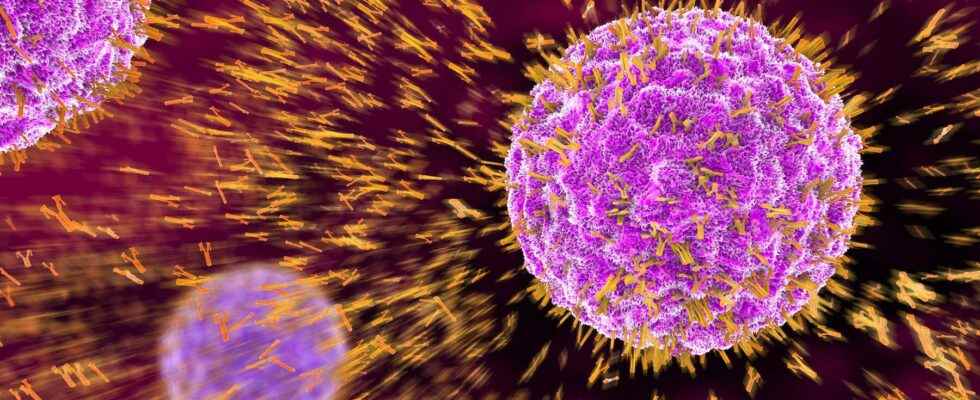Congenital or acquired immunosuppression is the condition in which a person’s immune responses are weakened. This situation increases the sensitivity to infectious agents and the probability of acquiring a pathology serious, even opportunistic (germs generally not very aggressive).
What are the causes of immunodeficiency?
The immune deficiency can be primary (or innate). Original genetic, it results in an operating deficit of the bone marrow at the origin of the production of the cells of theimmunity. The absence of phagocytes, lymphocytes B (and therefore antibody) or lymphocytes T is due to a anomaly from uncomfortable which codes for their training. Treatment is based on the control of infectious diseases: antibiotics, antivirals, antifungals, associated depending on the case with injections ofimmunoglobulins (antibody from donated blood) or even, in the most serious cases, a bone marrow transplant. The frequency of this anomaly is low, 1 in 10,000 people.
L’immunodeficiency so-called secondary or acquired is more widespread. It is caused by external factors and is the consequence of diseases (leukemia, lymphoma) or treatments (chemotherapy, immunosuppressive treatments). the HIV, virus human immunodeficiency is one example. By attacking T4 lymphocytes, this virus reduces the recognition mechanisms ofantigen by the cells of the‘immunity. Without treatment, the infected person will have recurring infections that can lead to death. Other conditions pathological may be accompanied by a greater or lesser degree of immunosuppression such as diabetes or therenal failure chronic.
The missed is also a component of immune system. The white pulp produces lymphocytes, so that after a splenectomy (ablation spleen) post-traumatic, for example, the body loses its ability to produce protective antibodies against the agents pathogens.
What are the possibilities in the face of immunodeficiency?
Whether innate or acquired, immunodeficiency leads to the management of infectious pathologies. In addition to anti-infective drugs, people with immunodeficiency should benefit from vaccine schedules adapted. The protocols vaccines are evaluated before the deterioration of the immune system when this is foreseeable (splenectomy, put on immunosuppressive treatment).
On the other hand, the immunocompromised cannot receive live attenuated vaccines due to the potential risks of the disease occurring. Some vaccines not recommended in the general population (infection with pneumococci) will therefore be recommended and the usual dosages, generally reinforced due to the weak immune response.
This is the case in the vaccination against Covid-19, for which the recommended protocol is based on a vaccination surroundings, a reduction in the spacing between doses, frequent serologies and‘administration of monoclonal antibodies recently available in the face of severe immunodeficiency.
You will also be interested
Interested in what you just read?
.
fs7
